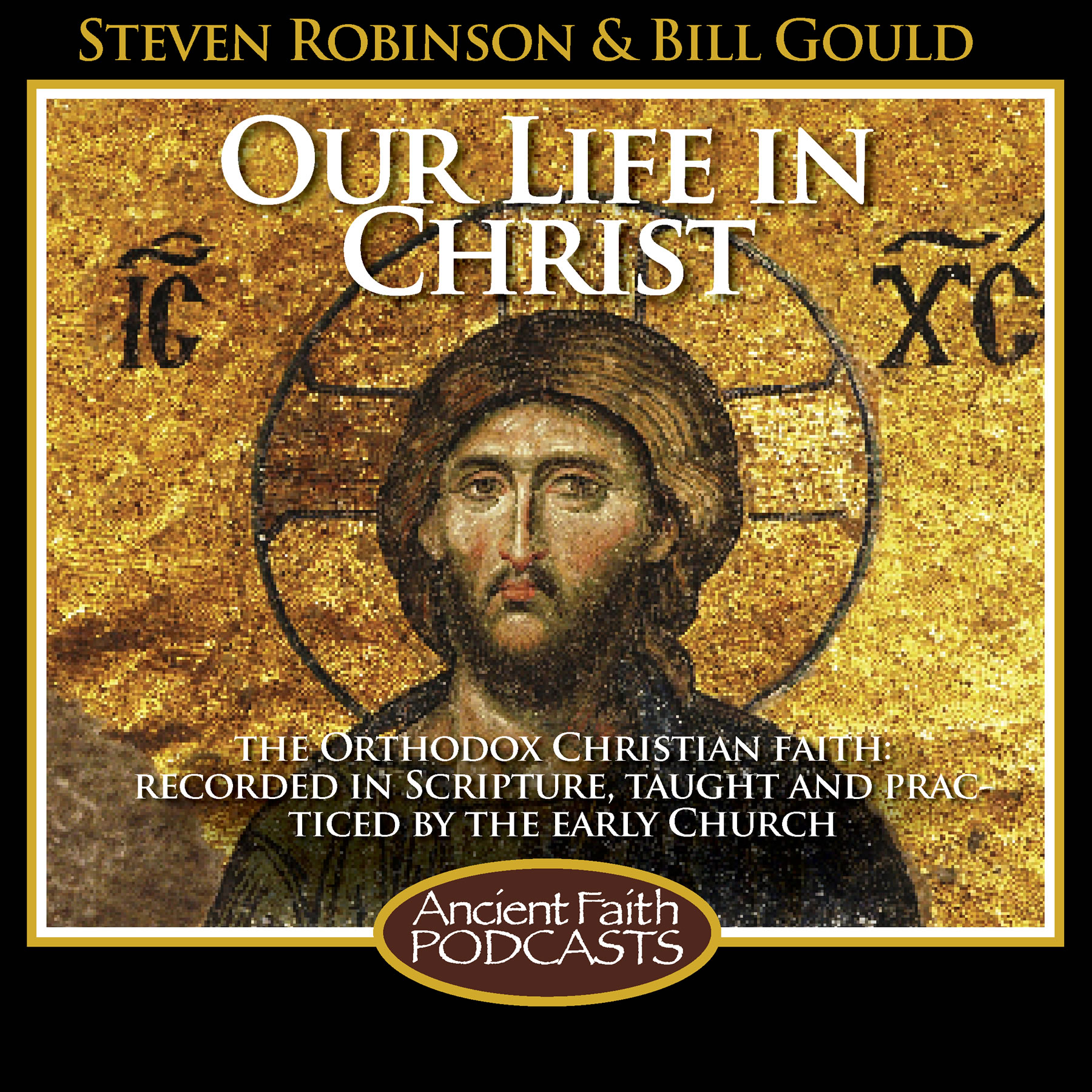Our Life in Christ
Holy Tradition and Holy Scripture
An interview with Fr. Chris Salamy
Thursday, September 18, 2014
Listen now DownloadSupport podcasts like this and more!
Donate NowTranscript
Oct. 18, 2004, 10:53 a.m.
Program Notes - October 17, 2004
Holy Tradition and Holy Scripture
- Sayings of the Fathers
- Two from St. Isaac the Syrian - Bishop of Nineveh 6th century
- Why do you trouble yourself in a house that is not your own? Let the sight of a dead man be a teacher for you concerning your departure from hence. St. Isaac the Syrian
- The knowledge of the Cross is concealed in the sufferings of the Cross. St. Isaac the Syrian
- Topic of the Day: The Relationship between Holy Scripture and Holy Tradition in the Orthodox Church
- Summary of last week - we spent some time on our program last week trying to convey the struggle that the Church went through to settle the questions regarding holy Icons and their place in the life and worship of the Church, and we wound up commenting on how the Protestant Reformers rekindled a brand of iconophobia, teaching exclusive reliance on the Scriptures (Sola Scriptura) for anything
- Today that has become for many a simplistic "The Bible says it, I believe it, and that settles it" kind of attitude - which is not bad in and of itself, but this also allows certain Christians to dismiss anything that they don't see explicitly written down in the pages of the New Testament as false or harmful.
- The Orthodox Church does not shrink from the fact that iconography is not mentioned specifically in the Scriptures, although it is, in that God made Man as an icon of Himself, and Christ in the flesh was and remains forever the perfect icon of the invisible God - (check out our show notes on the web site for the scripture references). The presence of icons in the Church comes as part of what we call Holy Tradition, and we're glad to have Father Chris to help us better understand what Holy Tradition is and why it is so very important for the Church.
- Reasons some will be suspicious of, or even reject, "tradition"
- Matt. 15: 1-20, specifically verse 3 - Jesus admonishes the Pharisees and scribes because they "transgressed the commandment of God" because of their "tradition" (but consider also that Jesus himself must have participated in many Jewish traditions - without condemning them).
- Paul also refers to negatively to "traditions of men" - the "rudiments of the world" in Colossians 2:8
- We typically associate traditions with attitudes and practices that need to be changed in order to better deal with reality - Jewish tradition ala "Fiddler on the Roof" - traditions make us stodgy and implacable, inflexible, unloving towards those that are different than us.
- Many liberal churches which still display their traditions outwardly are turning away from the historical faith - some protestant denominations and some of the Episcopal churches, and of course for Protestants, there's always the Roman church.
- Then there's always the problem of being traditional for the sake of being traditional - traditionalism - which is not in all cases a bad thing at all, but may not be for salvific purposes and can lead to a bad atttitude.
- What, then, does the Orthodox Church mean when it refers to the term "Tradition"?
- The New Testament does refer to another type of Tradition, a living, Holy Tradition directly from Jesus Christ and the Holy Spirit, one in which the Apostles themselves both participated in, were transformed by, and passed on to future generations of Christians
- The Holy Tradition is that which is "handed over", committed to, deposited with - and we find this action (paratheke), and the resulting teaching and practice that comes of it (paradosis), in the following NT contexts
- The oral teaching of Christ to his disciples - News flash! They did not write down everything He did and said - John 21:25
- The institution of the Lord's Supper in the upper room (compare this with 1 Corinthians 11:2), as well as the sanctification of John's baptism Discuss!
- The imparting of the Holy Spirit both in John 20:22 and at Pentecost in Acts 2
- The oral teaching and practices of the Apostles to the churches and their leaders
2 Corinthians 2:15, 3:6, 2 Timothy 1:13,14 - Contrast this with Colossians 2:8 - "traditions of men"
- The Gospels and Epistles of the New Testament themselves
- We then can affirm the following:
- The New Testament books do not contain all of the teaching and practice of the NT Church. The experience of the Apostles with God Himself in Christ and the Spirit, and the traditions (paradosis) they handed over (paratheke) as a result of their life in Christ and His Spirit, are also an indispensable possession of the Church of Christ,
- Therefore the books of the NT are not the only "deposit" the Church possesses.
- Fr. Chris: This subsection "i" is true that the NT is not the only "deposit" that we possess, however it is, together with the OT, the only reference we have. It is the only manifestation of God’s revelation to us. In other words, we do not exegete icons/Liturgy/et al to find truths about God, but rather, icons/Liturgy/et al are exegesis of the Word of God in a proper (or more accurately "correct") manner. This is evident through the writings of such Fathers as Chrysostom, Basil, Irenaeos, Gregory the Theologian, Athanasios, John of Damascus who make their cases regarding the Holy Spirit (Basil), Icons (John of D), Incarnation of Christ (Athanasios), Apostolic Preaching (Irenaeos) and Anything (Chrysostom) by "proving" their points through use of Scripture, while simultaneously exegeting the texts they’re using. It is also evident in the 7 Councils, most notably Nicaea I where the entirety of the Creed is verbatim from Scripture except that funny word "homoousios."
Orthodox/Athanasius of the same substance — homoousios
Eusebius of a similar substance — homoiousios
This would prove the opposite point except for the fact that if one reads the transcripts of the Council, they would quickly notice that there was great fighting (that’s the right word) because homoousios does not come from Scripture. In other words, how could they make a statement as important as the Creed that contains non-Scriptural phrases? (ultimately, we think they made the right choice, but nonetheless it shows their devotion to what they considered to be referential). And lastly, that the Word of God alone is referential is evident through our Liturgical tradition, where we see the first half of the D.L. as the Liturgy of the Word, which is entirely didactic, and the second half as the Liturgy of the Eucharist which involves (as Schmemann would say) a "re-presentation" of the life of Christ (which uses verbatim citations from Scripture) with the climax during the Anaphora where that same Word of God we heard is transformed by the Spirit into the Word of God become flesh so that we might partake (cf Gospel of John: Christ says, "he who eats my flesh and drinks my blood abides in me and I in him."). I think it is also noteworthy that the Divine Liturgy possesses 212 verbatim quotes from Scripture: 98 from the OT and 114 from the NT. - John 14:26 - Christ does not maintain that a written record is necessary to remind us of His teachings; but rather that the Holy Spirit (Who will "be with you always") will remind the Church of all that He taught .
- St. Basil the Great, 365-75 AD "Of the dogmas and preaching preserved in the Church, some we possess from written teaching and others we receive from the tradition of the Apostles, handed on to us in mystery. In respect to piety, both are of the same force."
- The New Testament books themselves are the "product" of the Holy Tradition, as well as a guarantor of the fidelity of Holy Tradition going forward in time - because they are inspired by the HS. IOWs, Holy Tradition and Holy Scripture are interdependent and intertwined to the point where trying to separate them is, besides being irrational, de-constructive to both.
- Fr. Chris: I might be inclined to discuss this point further. I maintain that the proper understanding of what Holy Tradition is would be to quote St. Vincent of Lerins: "Tradition is Scripture rightly understood." It is (in my opinion) not correct to juxtapose Scripture and Tradition, nor to place one over the other, nor to say that one is necessarily a product of the other. But rather, Scripture is the reference, Tradition is the method of enlivening/explaining/exegeting/making relevant the reference. Without Tradition, Scripture is just a dead word locked away in the pages of an ordinary book. And this "enlivening/etc." of the Word of God through/by the Holy Tradition is done within the life of the Church (i.e. Liturgy, iconography, hymns, et al) guided by the Holy Spirit. Ultimately, I might say that Tradition is the "mind" of the Church and the "mind" of the Fathers.
- George Florovsky: The true tradition is only the tradition of truth, traditio veritatis. This tradition, according of St. Irenaeus, is grounded in, and secured by, that charisma veritatis certum [secure charisma of truth], which has been "deposited" in the Church from the very beginning and has been preserved by the uninterrupted succession of episcopal ministry. "Tradition" in the Church is not a continuity of human memory, or a permanence of rites and habits. It is a living tradition—depositum juvenescens, in the phrase of St. Irenaeus. Accordingly, it cannot be counted inter mortuas regulas [among dead rules]. Ultimately, tradition is a continuity of the abiding presence of the Holy Spirit in the Church, a continuity of Divine guidance and illumination. The Church is not bound by the "letter." Rather, she is constantly moved forth by the "Spirit." The same Spirit, the Spirit of Truth, which "spake through the Prophets," which guided the Apostles, is still continuously guiding the Church into the fuller comprehension and understanding of the Divine truth, from glory to glory.
- Holy Tradition consists not only in the visible, verbal, and material work of Jesus and the Apostles, but also in the invisible, silent, and spiritual power of the Holy Spirit that accompanies the Truth of Christ, and changes men according to it. "He who has ears to hear let him hear" Matthew 13:43
- St. Ignatius of Antioch, Letter to the Ephesians: "He who possesses the word of Jesus, is truly able to hear even His very silence, that he may be perfect, and may both act as he speaks, and be recognized by his silence."
- But, having said this, we must affirm also that the presence and power of the Holy Spirit can be found in His Church, that Church which possesses the Holy Tradition. This is not to limit the Spirit of God or His work in the world "outside" of the visible Church, but rather to say that Holy Tradition as the Orthodox Church understands it cannot be divorced from the Holy Spirit. It also implies that there is, according to St. Basil the Great "a form of silence, an obscurity in the Scripture, in order to make it difficult to understand", so that those outside the Tradition must first become part of the tradition to achieve more understanding.
- How do we know that the Eastern Orthodox Church has continued in the Holy Tradition?
- The Promise of the Holy Spirit that He would be with the Church
- Unbroken line of Apostolic authority - the Bishops
- Councils and Creeds
- Discerned and repulsed heretical attacks
- Affirmed the Truth, not by inventing new doctrine, but articulating existing Truth as preserved and transmitted by the Tradition and confirmed in the Scriptures
- The lives of the saints
- Unwavering commitment to catholicity - change rarely happens, but when it does it takes place in conciliar fashion
- Can the Eastern Orthodox Church ever be wrong about its traditions? Is it infallible?
About
Our Life In Christ brings you the orthodox Christian faith as recorded in Scripture, taught and practiced by the early Fathers of the Church, and preserved within the spiritual life of the Orthodox Christian Churches around the world. Join program hosts Steven Robinson and Bill Gould for an hour of insightful discussion about Orthodox Christian faith and practice. We record the program in Steve’s basement lair, and distribute it here as a podcast, broadcast it on Ancient Faith Radio, and archive it on Our Life in Christ’s website. For more information about Our Life in Christ, visit OurLifeinChrist.com.
Contributors

 Steve Robinson
Steve Robinson
 Bill Gould
Bill Gould